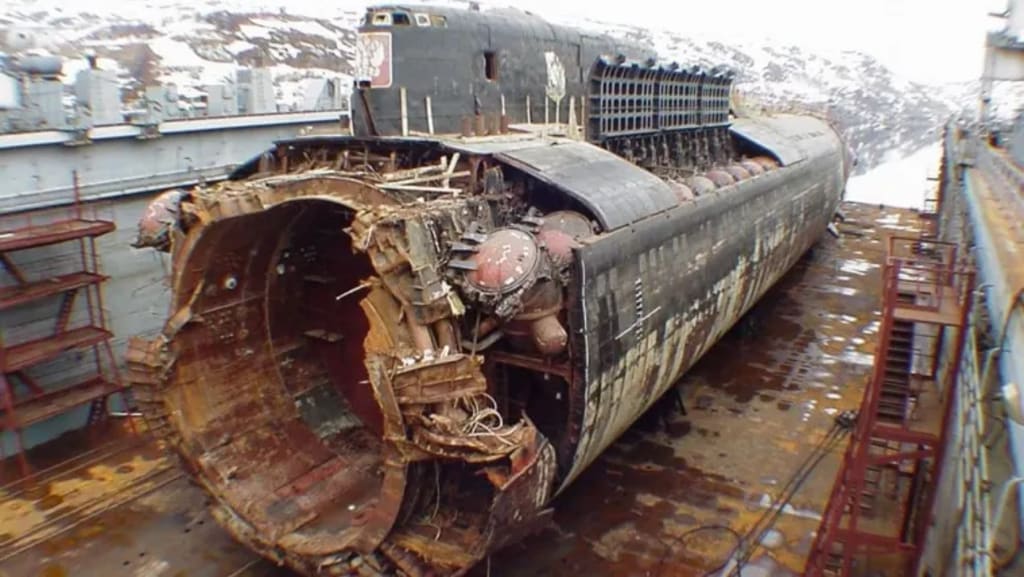The Sinking of Russia's 'Unsinkable' Kursk Submarine
When Pride Sank the Unsinkable: The Kursk Submarine Tragedy

On August 12, 2000, the Russian nuclear-powered submarine K-141 Kursk prepared to launch a torpedo during a naval training exercise in the frigid Arctic waters of the Barents Sea, north of Norway. This fateful exercise would end in tragedy, marking the sinking of the pride of the Russian Northern Fleet.
The Kursk was an Oscar-II class submarine, referred to by NATO as an Oscar-II. It had been specifically designed to combat the perceived threat of American aircraft carriers during the Cold War arms race between the Western nations, led by the United States, and the Soviet Union. The formidable Oscar-II submarines were powered by nuclear reactors, allowing them impressive speeds of up to 33 knots when submerged. At 154 meters long, Kursk could carry a devastating payload of 24 P-700 Granit missiles, each over 10 meters long and weighing 15,400 pounds.
On the morning of August 12, disaster struck during the torpedo launch exercise. A faulty practice torpedo caused a massive explosion that rocked the nearby Pyotr Velikiy battlecruiser on the surface and registered 1.5 on the Richter scale for seismic activity. The intense fireball destroyed the first two compartments of Kursk, killing the control room crew instantly. A second powerful blast two minutes later destroyed the bulkheads sealing the remaining compartments, likely killing all crew members forward of the sixth compartment. One runaway torpedo caused a deep gash in Kursk's side, sinking the pride of the Northern Fleet to the seabed 354 feet below. Though the nuclear reactors shut down safely, the double torpedo explosions and resulting fires had decimated much of the submarine and crew.
However, 23 sailors in the ninth rear compartment had managed to seal themselves off from the explosions. For three days, nearby ships detected desperate tapping sounds as these survivors attempted communication. But the Russian Navy downplayed the crisis and declined international assistance for five critical days, making only unsuccessful attempts to dock with the rear hatch themselves.
Among the trapped sailors was 27-year-old Dmitry Kolesnikov, one of the submarine's officers. Knowing that time was running out for the 23 men as oxygen depleted, he wrote a heart-breaking farewell note to his wife on a slip of paper by the illuminated dial of his watch. He detailed the explosions and made the difficult decision with the other officers to abandon forward sections and gather in the rear compartment. Kolesnikov justified their actions, saying there was no chance of saving anyone else after the massive initial blasts.
Two or three men had tried escaping from the rear hatch, the only hope for survival. But when that failed, escape was impossible and the men resigned themselves to their fates. The reason the hatch could not be opened remains unclear to this day. Russian authorities would later make deceptive statements about maintaining contact with and supporting those aboard, but in reality the survivors were completely on their own. The Northern Fleet did not even realize Kursk was in distress until six hours after the first explosion.
After finally accepting British and Norwegian assistance, the international divers opened the rear hatch five days after the accident. But for the 23 sequestered sailors, it was too late. Kolesnikov's heart-breaking note was found still folded in his pocket. Forensic evidence showed the men had tried desperately to replenish oxygen as it ran out, likely resulting in an explosion and flash fire from an oxygen canister dropped in the oily water filling the compartment. Ultimately a lack of oxygen would have led to loss of consciousness and death.
This avoidable tragedy was the first major crisis faced by Russia's new president, Vladimir Putin. He faced harsh criticism for the slow and secretive reaction by authorities. Continuing his vacation and refusing international aid requests offered in the critical first few days after the accident appeared callous, drawing anger from families of the dead.
Putin met with families and retrieved the sailors' bodies later in a show of respect. But though experts concluded the disaster was caused by the faulty practice torpedo detonating inside the tube, Russian authorities were reluctant to admit culpability and spread false accusations against the West.
The grieving mother of the youngest sailor, 19-year old Alexi Khrensov, voiced the painful betrayal many families felt after needless loss of life: "People get punished when they betray their country. But what if a country betrays its people?" Despite recognizing mistakes in hindsight, Putin honoured the lost Kursk crew as heroes and awarded them the Order of Courage.
The sinking of the Kursk submarine was Russia's worst naval disaster since World War II. The tragedy revealed inadequacies in training, equipment, leadership and transparency in the Russian military and government. And though unavoidable accidents will always occur, many question if the 23 sailors trapped in the rear compartment could have been saved had the operation relied less on Russian pride and more on international cooperation. What matters most to the families of those lost is that the unnecessary loss of life aboard Kursk should serve as a lesson for the future. No vessel, nuclear or otherwise, is truly unsinkable. And all sailors pledge to protect and save their crews when disaster strikes.
About the Creator
KWAO LEARNER WINFRED
History is my passion. Ever since I was a child, I've been fascinated by the stories of the past. I eagerly soaked up tales of ancient civilizations, heroic adventures.






Comments (1)
Very interesting! Great job!